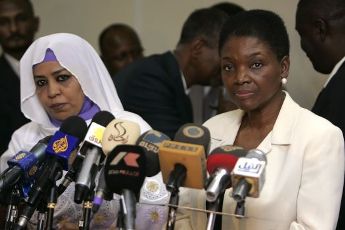SPLM-N calls for UN humanitarian chief to visit rebel-held conflict areas
May 19, 2013 (KHARTOUM) – The rebel Sudan People’s Liberation Movement-North (SPLM-N) has called on the head of the UN’s humanitarian agency to visit areas in Blue Nile, South Kordofan and Darfur outside of Sudanese government control that have been off-limits for the past two years.

Amos, the under-secretary-general for humanitarian affairs and emergency relief coordinator, is due to arrive in Khartoum on Monday.
Arman says the visit comes at a critical time, with Sudan witnessing a worsening humanitarian crisis in Blue Nile, South Kordofan, North Kordofan and Darfur states.
He says an estimated 4 million civilians have been displaced as a result of the decade-long war in Darfur, while the Sudanese government continues to deny humanitarian access in the border states of Blue Nile and South Kordofan, where its army (SAF) simultaneously carries out aerial and ground bombardments against the civilian population.
MAGNITUDE OF THE CRISIS
In its statement, the SPLM-N called on Amos to consider visiting rebel-held areas which have previously been off-limits in order to report to the international community the true depth of the humanitarian crisis in the region, rather than visiting areas pre-selected by the government that do not reflect the magnitude of the crisis.
There are also calls for Amos to meet with the SPLM’s political leadership and its humanitarian wing during her upcoming visit in order to obtain information from both parties to the conflict.
“Khartoum is not interested in addressing the humanitarian situation and as usual is buying time, using the visits of high profile international officials to give lip service to the humanitarian situation”, said Arman.
“The Sudanese regime and [Sudanese president] general [Omer] al-Bashir have been the largest manufacturer of the humanitarian crisis in Africa for 24 years continuously and the present regime has a long record of targeting civilian populations and destroying lives. They are permanently on the humanitarian crisis list for almost a quarter of a century – the same regime with the same personalities”, he added.
OCHA says Amos plans to meet with officials from the Sudanese government, including Bashir, as well as representatives from humanitarian organisations, with discussions to focus on ways to improve humanitarian access to people affected by conflict and displacement, particularly in South Kordofan, Blue Nile and Darfur.
The under-secretary-general is also expected to travel to Darfur to see for herself the ongoing humanitarian operation in Sudan’s western region.
TOUGH STANCE NEEDED
Arman has urged Amos to take a firm stance on the Sudanese government’s continued refusal to allow unfettered humanitarian access to conflict-affected areas, saying it constituted a war crime under international humanitarian law.
He said the SPLM-N stood ready to work with OCHA on a proposed vaccination program to target preventable diseases, such as pertussis and measles.
“We equally stated the need for a brief cessation of hostilities to carry out the vaccination plan since Khartoum [has] refused – for more than one-year – a full humanitarian cessation of hostilities. In the absence of a humanitarian agreement with Khartoum and given the war situation, there is a need to agree on where the vaccination program will originate from”, he said.
Fighting erupted in South Kordofan in September 2011 when Southern-aligned SPLM-N rebels launched an insurgency against the Khartoum government, with the conflict spreading to neighbouring Blue Nile state a few months later.
According to Arman, some 24 civilians were killed in the last three months alone in Blue Nile and the Nuba Mountains, with many more injured as a result of aerial bombardments.
More than 700 people, including internally displaced persons (IDPs) and SPLM-N activists, have been arrested in government-held areas. Some of them were subjected to torture, while others were sentenced to death. Those arrested include 138 in Blue Nile state and about 200 from the Nuba Mountains area in South Kordofan state, including 45 women – some of whom are pregnant – as well as more than 50 leaders of the SPLM-N.
Meanwhile, more than 200 people have been arrested from Darfur and North Kordofan, including SPLM-N activists.
(ST)
